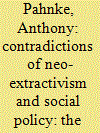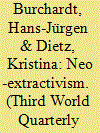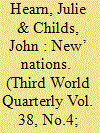| Srl | Item |
| 1 |
ID:
163061


|
|
|
|
|
| Summary/Abstract |
This article explores how contradictory development tendencies within Brazil’s primary sector have contributed to the country’s enduring political crisis. I show that President Rousseff, when dealing with declining royalty payments from natural resource exports and a decrease in tax revenue from imports, financed social policies in ways that her opponents branded as unconstitutional to remove her from power. After documenting the central players within the political crisis, namely those who have been under investigation in Operação Lava Jato (Operation Car Wash), I illustrate how the ongoing corruption scandals plaguing Brazil have their roots in the country’s raw material export industries.
|
|
|
|
|
|
|
|
|
|
|
|
|
|
|
|
| 2 |
ID:
131381


|
|
|
|
|
| Publication |
2014.
|
| Summary/Abstract |
This paper addresses new challenges and identifies starting points for development theory following recent debates in Latin America on 'new or neo-extractivism'. It focuses on the concept of neo-extractivism and the context of its emergence, and on the changing role of the state. Looking at a number of social economic indicators, we find that, even after considering differences between countries, (neo-)extractivism is not merely a temporary economic strategy in the region. Instead, it exhibits features of a consolidated development project. Empirical evidence from the region shows the fundamental implications of resource-based development paths in politics, social relations and territorial orders. To grasp these implications conceptually, we argue for a shift in theoretical perspectives related to the link between development and resource extraction. Key elements for such a shift are to be found in recent studies in rentier theory and politics and new approaches in the field of political ecology.
|
|
|
|
|
|
|
|
|
|
|
|
|
|
|
|
| 3 |
ID:
152080


|
|
|
|
|
| Summary/Abstract |
Recently there have been increasing instances of the return of the state as the central agent of development in resource-rich nations globally. Characterised by both a rhetorical and substantive commitment to increasing control over national resource revenues, this so-called new/neo-extractivism has attracted a debate concerning the extent to which it offers a viable alternative to the imperatives of neoliberal resource extraction. Using two examples, this paper analyses the ways in which the Ghanaian and Ecuadorean states discursively imagine such structural transformations. It highlights the value in analysing the politics of language for strengthening studies of neo-extractivism.
|
|
|
|
|
|
|
|
|
|
|
|
|
|
|
|